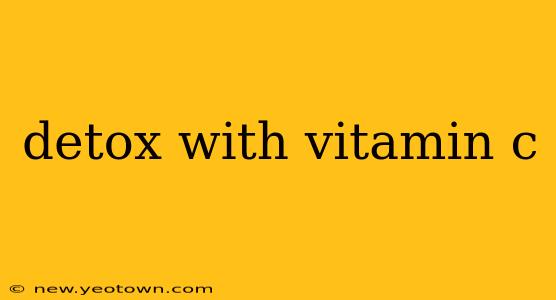The idea of a "detox" is incredibly popular, promising a quick fix to cleanse the body of toxins and impurities. But what about detoxing with vitamin C? Is it a miracle cure, or just another wellness trend? Let's unravel the science behind this popular claim and explore what vitamin C really does for your body. Our journey begins not with a magical potion, but with a closer look at what "detox" actually means.
What Does Detoxing Actually Mean?
The term "detox" is often thrown around loosely. Our bodies already possess incredibly efficient detoxification systems – the liver and kidneys – constantly working to filter out harmful substances. While consuming excessive amounts of certain substances might temporarily overload these systems, the idea of needing a special "detox" to rid your body of toxins is largely a misconception perpetuated by marketing. This doesn't negate the benefits of a healthy lifestyle, but it does call into question the need for specialized detox programs.
Can Vitamin C Help with Detoxification?
Vitamin C, or ascorbic acid, is an essential nutrient with potent antioxidant properties. Antioxidants help neutralize harmful free radicals in the body, molecules that can damage cells and contribute to aging and disease. This antioxidant action is where the connection to detoxification comes in. By neutralizing free radicals, vitamin C indirectly supports the body's natural detoxification processes. However, it's not a direct detoxifier in the way some marketing materials might suggest.
Does Vitamin C Help the Liver Detoxify?
The liver is the body's primary detoxification organ. While vitamin C doesn't directly help the liver detoxify in the sense of speeding up its processes, it does support its overall health and function. A healthy liver is crucial for efficient detoxification, and vitamin C contributes to this by protecting liver cells from oxidative damage. It's a supporting role, not a starring one.
Is Vitamin C a Liver Protectant?
Numerous studies have shown that vitamin C possesses hepatoprotective properties, meaning it can help protect the liver from damage. This protective effect is linked to its antioxidant abilities and its role in supporting the liver's metabolic functions. This liver protection is indirectly beneficial for detoxification, as a healthier liver can function more effectively.
Can Vitamin C Flush Out Toxins?
The concept of "flushing out toxins" is often misleading. The body naturally eliminates waste products through urine, sweat, and feces. Vitamin C doesn't directly "flush" toxins out; rather, it supports the body's existing mechanisms by reducing oxidative stress and protecting cells from damage.
How Much Vitamin C Should I Take for Detoxification?
There's no magic dose of vitamin C that will magically "detox" your body. The recommended daily allowance of vitamin C varies depending on age and other factors, but generally, adults should aim for around 75-90mg per day. Exceeding the recommended dose doesn't necessarily equate to increased detoxification benefits and can lead to digestive upset or other side effects. Always consult a doctor before significantly increasing your vitamin C intake.
What are the Side Effects of Taking Too Much Vitamin C?
Consuming excessive amounts of vitamin C can lead to several unpleasant side effects, including diarrhea, nausea, stomach cramps, and heartburn. Additionally, high doses of vitamin C can interfere with certain medications. Therefore, moderation is key.
Conclusion: A Balanced Approach to Wellness
While vitamin C is a vital nutrient with antioxidant properties that indirectly support the body's natural detoxification processes, it's not a standalone detox solution. A healthy lifestyle encompassing a balanced diet, regular exercise, adequate hydration, and stress management is far more effective for overall well-being than relying on quick-fix detox products or supplements. Think of vitamin C as a supporting player in a larger orchestra of health and wellness – a vital component, but not the entire performance.

